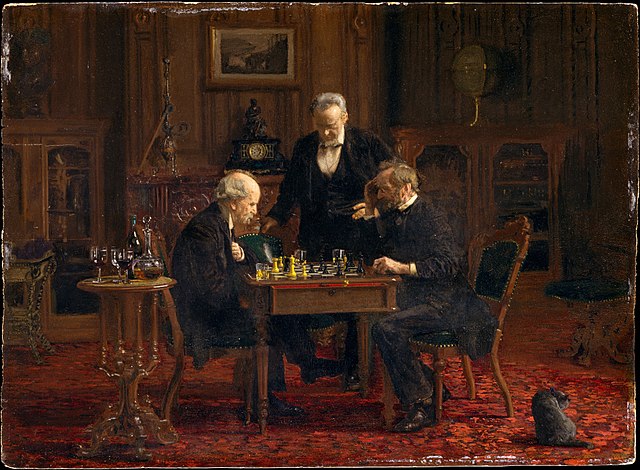The answer seems to be an obvious “no,” but pondering the question a bit longer might yield insights into the nature and psychology of martial arts.
In the past few days, the World Championship of chess has been taking place in the St Regis Hotel in Astana, Kazakhstan. The finalists are Russian Ian Nepomniachtchi and Chinese Ding Liran. Two consummate professionals in their art. They face each other for the prized title of World Champion and thus as master of the Grand Masters. The event is in many ways like any other sporting event, but the similarities to martial arts are striking, and indeed, the game itself mirrors combative sports.
As I’ve argued in previous pieces, the connection between ancient warfare and combat sports is clear. The javelin thrower of the modern Olympic Games is a distant echo of the warring times when the javelin, instead of seeking to land at the furthest point on a field, aimed to strike a distant foe on the opposite divide of the battle lines. Chess, although lacking a certain physical dimension of combat sport, is nevertheless built around the same premises: man against man, one winner, one loser (unless, as also happens in physical sports, there is a draw), but instead of being a show of strength and a display of embodied existence, the chess match lifts us to another layer of abstraction, showcasing a war of intellects.
Anyone who has played will know the sensation when it is clear what will happen as long as you play your pieces right. You chase the surrounding and defending bishops and pawns away, get rid of opposing knights and the queen, eventually cornering the king and delivering the decisive and lethal blow.
THE GAME
The game itself portrays a battle; pawns and knights go out to meet a foe with the sole aim of delivering the deadly checkmate, literally deriving from the Persian phrase “shah mat” (the king is dead). The players seek to outwit, outplay, catch out, and beat down their opponent. Anyone who has played will know the sensation when it is clear what will happen as long as you play your pieces right. You chase the surrounding and defending bishops and pawns away, get rid of opposing knights and the queen, eventually cornering the king and delivering the decisive and lethal blow. But equally, players will know the feeling of losing to a surprise attack delivered with seeming obviousness despite a sense of being impervious to the enemy’s attack.
What I have described above can go for a martial arts fight as well. A fighter knows when he has the upper hand, deploying various tactics and grips which have been rehearsed a thousand times in the dojo, systematically wearing down the will and determination of the opponent. And, simultaneously, many fighters – but far from all – will know the surprise attack which delivers a fatal KO. Think of Masvidal’s knockout loss to Kamaru Usman, or indeed his defeat of Ben Askren.
MIND VS MATTER
Chess is a game that predominantly takes place in the mind. Bobby Fisher, the famous chess player who defeated Russian Boris Spassky in 1972, was known to exercise regularly. But the game itself requires little to no physical exertion in the sense that running, wrestling, swimming, or javelin-throwing might. But it has its physical presence. The board, the pieces, and most importantly the opponent. Like poker, the face and slit movements tell of an opponent’s mood, state of mind, and confidence. Planned attacks can be avoided if you catch the enemy’s ill-hidden joy at having seen a potentially decisive attack. You see the excitement and take a closer look at the board and ensure you see it too.
On a larger scale, chess embodies world events, just as boxing might. We have written about how the world watched the Joe Louis vs Max Schmeling fights and the gravity of the fights in light of the World War. In a similar vein, Fisher vs Spassky was a fight showcasing American ingenuity vs Soviet might. Events, such as sports, take place within a global context, and when there are ongoing global conflicts the events take on a graver significance. Similarly, Colby Covington is keen on fighting Leon Edwards for the UFC Welterweight title, and to procure the fights he refers to the American War of Independence to predict an American victory. Even history informs displays of strength in the sporting arena.
So how is chess a martial art? In a classical sense, it isn’t. Martial arts, such as BJJ, might resemble chess in the tactics that need to be utilised and the thinking that is required. But on a surface level, the two are worlds apart. Yet, classical definitions of martial arts describe them as “any of various fighting sports or skills.” Skills might carry the stronger weight here – for chess is a strategic game, showcasing the strategic and tactical aspects of fighting. Chess can sharpen the mind, it awakens the same feelings of wish to win and aversion to loss in the players as is experienced by a fighter. In our age, there is even a sport called “chess boxing” which has developed, alternating between rounds of chess and boxing.
Chess is not a traditional martial art, but it hails from a martial pedigree and utilises combative language. Perhaps that’s where the similarities end. But set up a board, face your opponent, and see if you don’t get a similar rush of adrenalin when you know your lethal blow is just one move away.
Lyssna på det senaste avsnittet av Fighterpodden!

Kommentarer